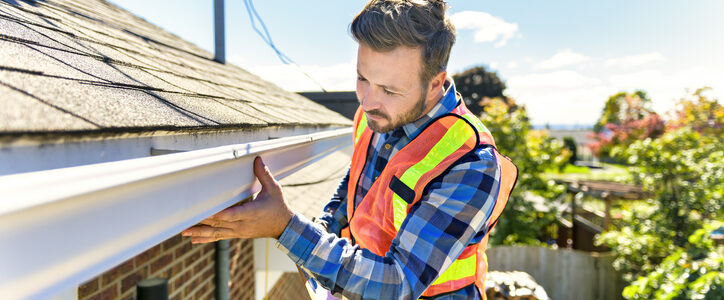Storms threaten business safety and security. Intense wind and rain can smash windows, damage foundations, and cause flooding. The risk of extreme weather has increased over the years, and business owners must be prepared.
Businesses that take practical measures and invest in quality insurance can help keep their companies safe. Read on to learn how you can take steps to protect your assets.
Risk Management and Loss Prevention Measures
Maintain Your Roof
Your roof is one of the most vulnerable areas of your building during a hurricane, tornado, or other high wind event. Regular maintenance can help ensure it holds up during a storm.
Plan regular roof inspections, especially after seasonal changes and storms. Look for tears, cracks, bubbles, and pooling water. Remove debris that can cause water backups and pest infestations.
Check Your Perimeter Flashing
Perimeter flashing refers to material installed around the edge of the roof to protect it from the elements. It must be well maintained. Repair poorly fitted and loose components so you are prepared for the next storm.
Ensure Roof Mounted Equipment is Secured
Roof-mounted equipment includes equipment like air conditioners, compressors, condensers, pipes, and vents. These components can become loose during a storm and cause damage or become damaged.
Ensure your equipment is securely attached to the roof. Clear all debris around the equipment to avoid water pooling. Look for any loose flashing around the equipment which could lead to damage.
Secure Signs and Accessories
Outdoor signage and displays can be impacted by wind and rain. They can become damaged or become loose and cause damage.
Business owners should consider removing outdoor signs and accessories and store them safely when storms are expected. If the components cannot be removed, they should be inspected to ensure they are safely secured and can withstand the elements.
Have Backup Power Generators on Hand
Electricity is often interrupted during severe storms causing businesses to shut down and lose productivity. Companies with generators will experience fewer disruptions.
Generators should be stored in safe, dry locations. They should be operated according to manufacturer instructions and should not be used indoors or in other confined spaces due to the risk of carbon monoxide. Business owners should have fuel on hand and should test generators regularly to ensure they provide the necessary power.
Protect Windows and Shutters
Windows and shutters are often damaged during storms. An impact-rated window and shutter system is designed to withstand wind and rain. However, they must be maintained properly.
Conduct inspections regularly to ensure there are no ill-fitting gaskets that can lead to water infiltration. All connections should be tightly attached. Test that they are functioning properly throughout the year.
Invest in Lightning Protection Systems
Lightning protection systems can protect your business from dangerous lightning. They allow the lightning to travel to the ground without doing any damage.
Inspect your lightning protection system throughout the year to ensure it is working properly. The securements and conductor poles should be well connected.
If a cable connector requires replacement, consider installing closed loop rather than 3-prong connectors. Closed loop connectors tend to hold up better during storms.
Commercial Doors Should Be Storm Ready
Commercial doors are typically sturdier than residential doors, but even they can be damaged in a storm. Make your doors storm-ready by checking that they are tightly secured and have all their nuts and bolts.
Inspect them for warping, rust, and other signs of damage. If damage is extensive, consider a replacement. All commercial doors should be wind-rated to endure stormy seasons.
Prepare Your Employees
Employees should be well prepared for weather emergencies. If a storm is coming, close brick-and-mortar locations when feasible and prepare for remote work. Ensure employees have the equipment they need to conduct work virtually.
Have an evacuation plan to help keep workers safe if a storm hits unexpectedly. Keep emergency supplies such as first aid kits, nonperishable foods, and medications on hand.
Invest in Quality Insurance
Businesses that invest in quality insurance can be better protected against losses from storm-related damage. Most commercial property insurance includes hail and windstorm damage coverage. If this coverage is not included in your policy, you may have to purchase it as an add-on.
You may also consider a policy that bundles general liability with commercial property insurance. It could be a money-saving solution.
Acadia Insurance is here to answer any questions you may have about storm safety and security. Visit acadiainsurance.com to find an agent near you.
There for You: Acadia Insurance
At Acadia, we’re all about helping businesses throughout the Northeast thrive. Our mission is to provide superior service and product as close to you as possible, providing you with the coverage you need to proceed with confidence. We are committed to proactive risk management and comprehensive financial protection.
We understand what you want most from your insurance is security and peace of mind. That means knowing you are working with an insurance provider who will support you every step of the way to help you protect your business.
With Acadia, not only can you get coverage tailored to your needs, but you will also receive support from dedicated claims professionals to guide you through the claim process in the event of a loss. That way, you know exactly what to expect. Knowing your claims professional by name and a handshake – that’s “Closer Coverage”. Get to know more about how we work and find an agent near you by going to the Find an Agent section on our public website (www.acadiainsurance.com).
Acadia is pleased to share this material for the benefit of its customers. Please note, however, that nothing herein should be construed as either legal advice or the provision of professional consulting services. This material is for informational purposes only, and while reasonable care has been utilized in compiling this information, no warranty or representation is made as to accuracy or completeness. Recipients of this material must utilize their own judgment in implementing sound risk management practices and procedures.




